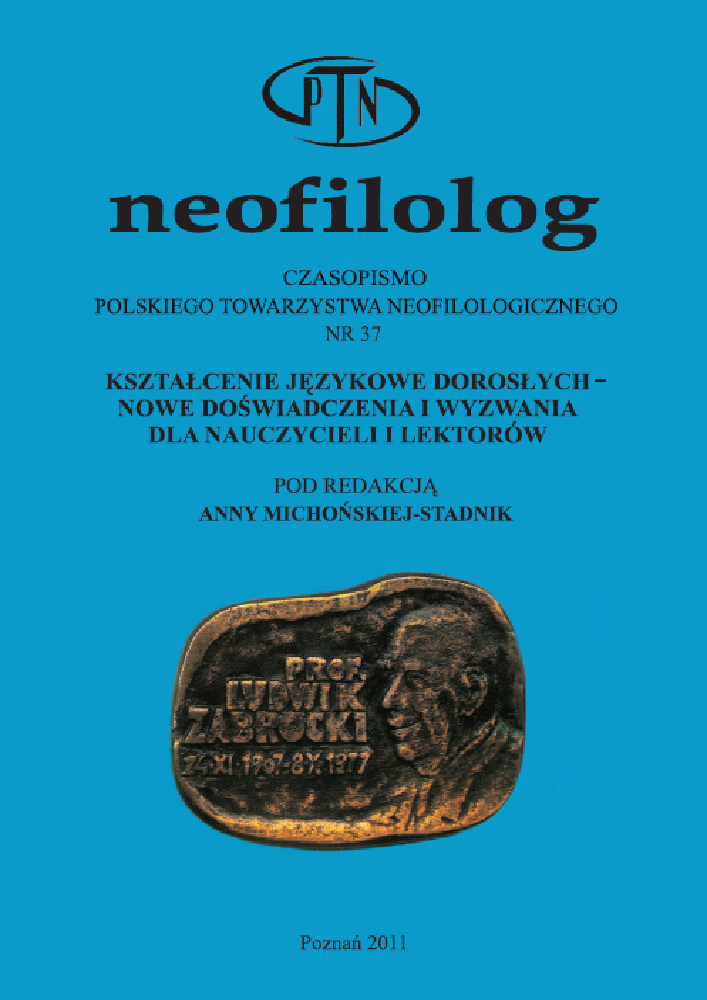Abstract
Knowing that there is a definite link between instructor – student interaction and students’ affect, as there is between affect and learning, the article pro-vides a look at the ways in which FL teachers address adult learners. Teaching adult learners in general constitutes a challenge since the group are especially sensitive to self image and easily get demotivated. Teacher’s behaviour, her attitude to the adult student and the atmosphere of learning are among the most important motivational factors for adults. The article is an attempt at presenting specific interactional strategies good teachers practice in order to motivate adults, offer them a sense of security and satisfy their face needs.
Literaturhinweise
Askildson, L. 2005. „Effects of humor in the language classroom. Humor as a tool in theory and Practice”. Arizona Working Papers in SLAT – Vol. 12, pp 45-61. http://w3.coh.arizona.edu/. DW: 12.03.20011.
Bye, D., Pushkar, D. i Conway, M. 2007. „Motivation, Interest, and Positive Affect in Traditional and Nontraditional Undergraduate Students”. Adult Education Quarterly, 57: 141-158.
De Andres, V. 1999. „Self-esteem in the classroom or the metamorphosis of butterflies.” (w:) Affect in language learning. (red. J. Arnold). Cambridge: Cambridge University Press.
Dörnyei, Z. 2001. Teaching and Researching Motivation. England: Pearson Education Limited.
http://ec.europa.eu/education/languages/language-teaching/doc52_pl.htm. Nauczanie języków obcych. Edukacja dorosłych. DW: 18.02.2011.
Jiang, X. 2010. „A Case Study of Teacher’s Politeness in EFL Class”. Journal of Language Teaching and Research, 5, 651-655. http://ojs.academypublisher.com. DW: 1.03.2011.
Knowles, M. S., E. F. Holton III i R. A. Swanson. 2009. Edukacja dorosłych. Wy-dawnictwo Naukowe PWN.
Komorowska, H. 2007. Metodyka nauczania języków obcych. Warszawa: Fraszka Edukacyjna.
Oxford, R. L. 1999. „Anxiety and the language learner: new insights.” (w:) Affect in language learning. (red. J. Arnold). Cambridge: Cambridge University Press: 58-67.
Pierścieniak, K. 2005. „Specyfika uczenia się dorosłych” (w:) Poradnik Edukatora (red. M. Owczarz). Warszawa: Wydawnictwo CODN: 17-28.
Rapley, T. 2010. Analiza konwersacji, dyskursu i dokumentów. Warszawa: Wydawnictwo Naukowe.
Schmitz, J. R. 2002. „Humor as a pedagogical tool in foreign language and trans-lation courses.” Humor: International Journal of Humor Research, 15-1: 89-113.
Wowro, I. 2009. „Rola treści humorystycznych w nauczaniu języka obcego. Analiza wybranych podręczników do nauki języka niemieckiego.” Neofilo-log, 33: 269-282.
Zhao, W. 2010. „An investigation of students’ face wants in Chinese English teachers’ Classroom Feedback”. Journal of Language Teaching and Research, Vol. 1, No. 1: 29-34.
Lizenz
Copyright (c) 1970 Agnieszka Strzałka

Dieses Werk steht unter der Lizenz Creative Commons Namensnennung - Keine Bearbeitungen 4.0 International.
Autoren:
Die Autoren der zur Veröffentlichung in der Zeitschrift Neofilolog angenommenen Texte sind verpflichtet, den Vertrag über die Erteilung einer kostenlosen Lizenz für die Werke mit der Verpflichtung zur Erteilung einer Sublizenz CC auszufüllen, zu unterzeichnen und an die Adresse der Redaktion zurückzusenden.
Gemäß Vertrag erteilen die Autoren auf die in der Zeitschrift Neofilolog veröffentlichten Texte der Adam-Mickiewicz-Universität in Poznań eine nicht exklusive und kostenlose Lizenz und erlauben die Verwendung der Sublizenz Creative Commons Attribution-NoDerivatives 4.0 International (CC BY-ND 4.0).
Die Autoren behalten das Recht zur weiteren freien Verfügung über das Werk.
Benutzer:
Interessierte Onlinebenutzer dürfen die seit 2017 veröffentlichten Werke unter folgenden Bedingungen nutzen:
- Anerkennung der Urheberschaft - die Verpflichtung, zusammen mit dem verbreiteten Werk Informationen über die Urheberschaft, den Titel, die Quelle (Links zum Originalwerk, DOI) und die Lizenz selbst bereitzustellen;
- ohne Schaffung abgeleiteter Werke - das Werk muss in seiner ursprünglichen Form erhalten bleiben, ohne Zustimmung des Autors dürfen keine Studien, beispielsweise Übersetzungen, verbreitet werden.
Die Urheberrechte aller veröffentlichen Texte sind vorbehalten.
Sonstige:
Die Adam-Mickiewicz-Universität in Poznań behält das Recht auf die Zeitschrift als Gesamtheit (Layout, Grafik, Titel, Umschlagsprojekt, Logo usw.).
